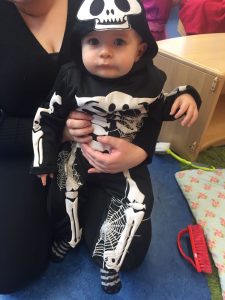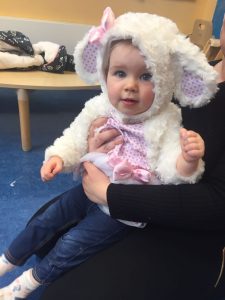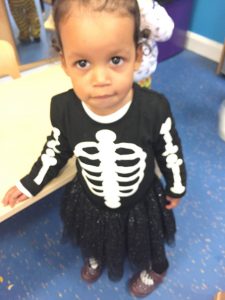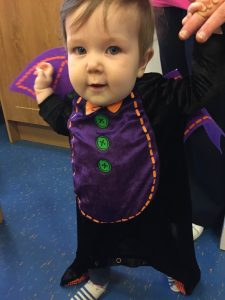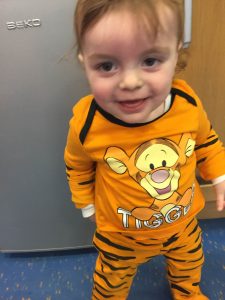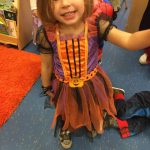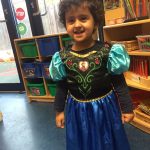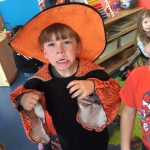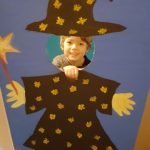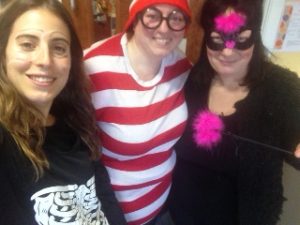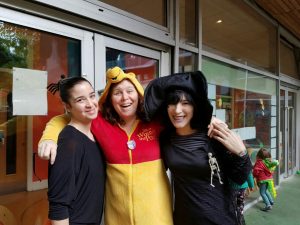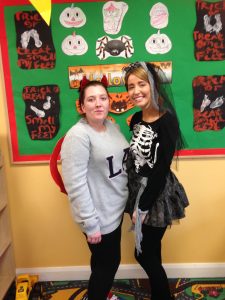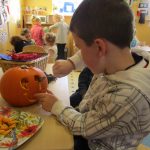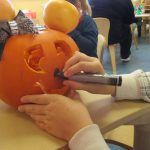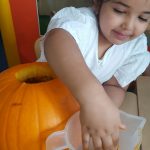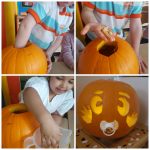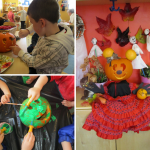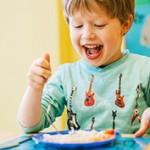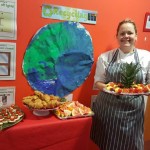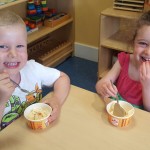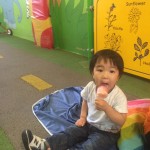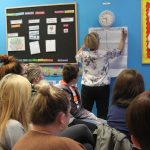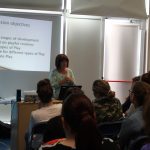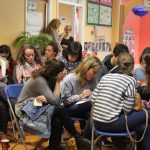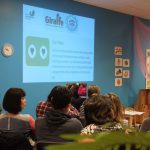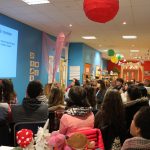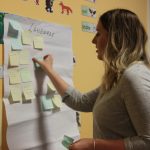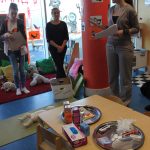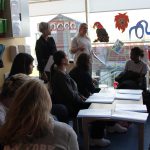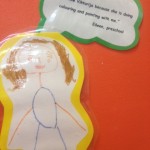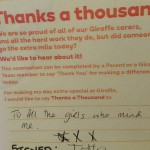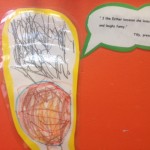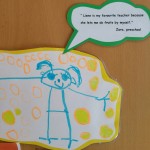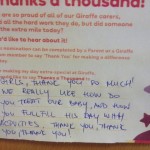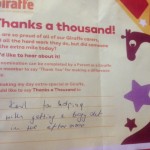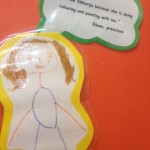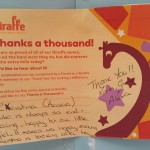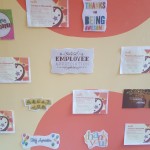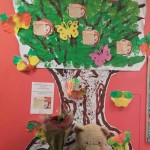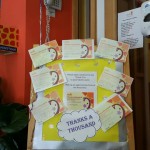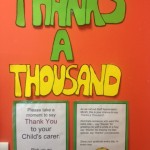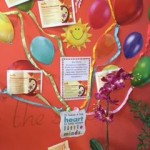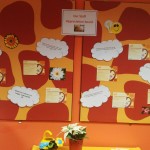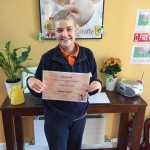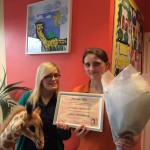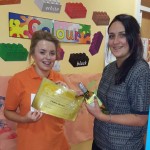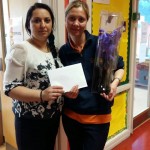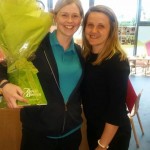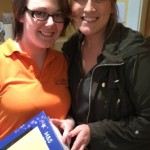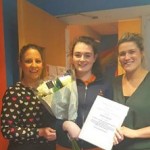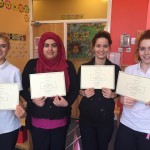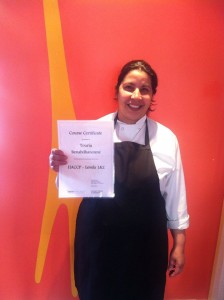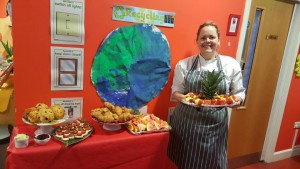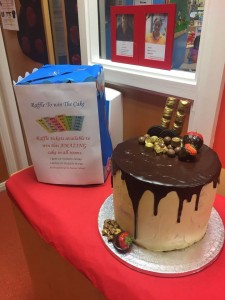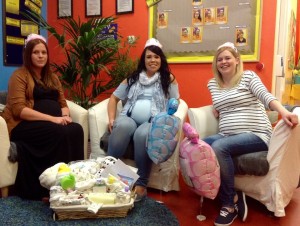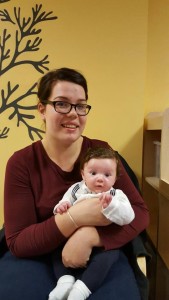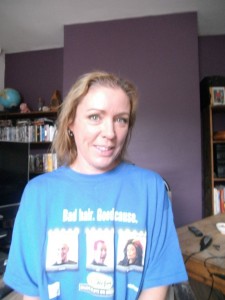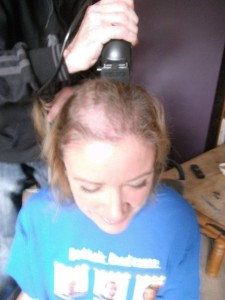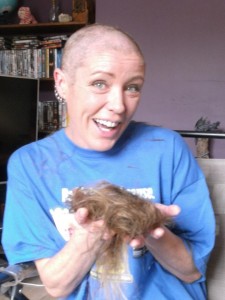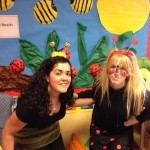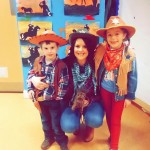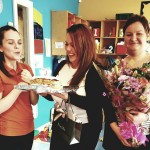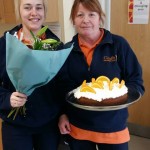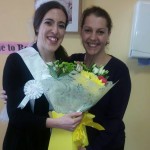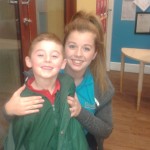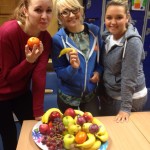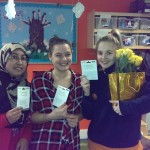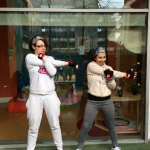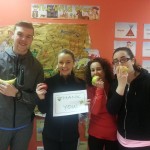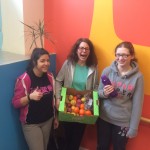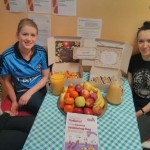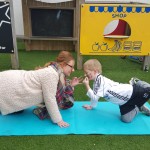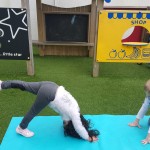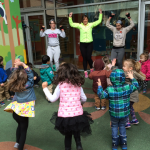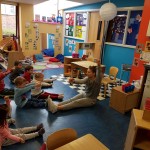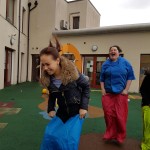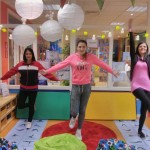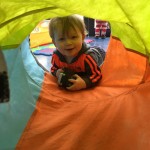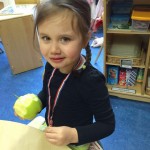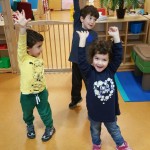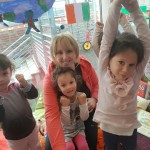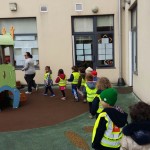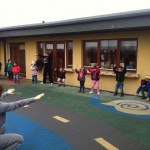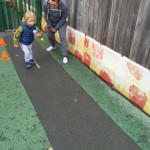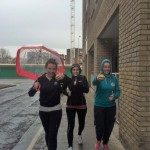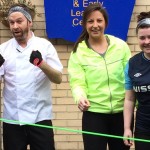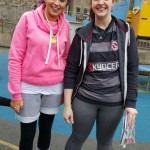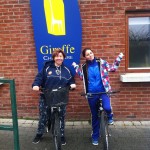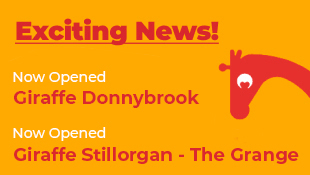A parent’s guide to heuristic play and treasure baskets
What is Heuristic Play?
New mums often encounter the term Heuristic Play for the first time at a mother and toddlers group or when their child starts crèche. Heuristic Play actually sounds much grander than it really is but do not underestimate its value: it is a term coined by child psychologist (Elinor Goldschmeid) who developed treasure baskets for babies and the heuristic play approach for toddlers which describes the activity of babies and young children as they explore objects from the real world.
The thinking behind it is not new and is something that we are all familiar with. Give a young child a present and more than likely, he or she wants to spend time scrunching the wrapping paper or eating it instead of playing with the toy itself. Our parents and grandparents already knew about this without even realising it. We played with saucepans and wooden spoons in the kitchen which we banged together, we stirred and poured rice with a jug and a funnel and a highlight was to have a basin of water!
Heuristic is defined as enabling a person to discover or learn something for themselves. It is rooted in young children’s natural curiosity. As babies grow, they move beyond being content to simply feel and ponder objects to wanting to find out what can be done with them. By using a treasure basket with children at this age you are providing them with rich mental stimulation, which not only activates the growth of the brain but also provides highly satisfying learning experiences. Household or kitchen utensils offer these opportunities and can occupy a child for surprising stretches of time as they concentrate on stacking pots, exploring the objects or sometimes just enjoying the new and interesting banging noise of a wooden spoon on a saucepan!
Make it fun
We live in a world where plastic toys dominate the shelves of toy shops, but plastic is dull and disappointing for babies, and whilst each rattle may look different each one smells, tastes and feels the same – it is unstimulating to their senses. Using heuristic play with babies stimulates all the senses, creating a rich learning experience as during this stage, a baby’s primal instinct is to explore objects by handling and sucking on them in order to find out about their physical characteristics.
Parents love watching their children discover and explore which is inherently what treasure baskets and heuristic play encourages. It is not a novel idea as children have been fascinated with exploring household items for generations. Nothing delights more than a child’s sense of wonder when they make a discovery and in turn it appeals to our sense of wonderment and delights as we observe children developing wonderment of their own! When a child makes a discovery or an interesting sound is produced, they often repeat the action again and again, to test the result which strengthens cognitive development as well as muscle control and hand/eye co-ordination.
What should go into the basket?
There should be a wide range of objects both natural and man-made that will stimulate all of the senses and that can be used as open-ended tools for exploration and imagination.
Include a good range of textures, shapes and materials and all should be non-toxic with no tiny pieces.
Consider some of the following……an old CD, a sparkly glitter ball, keys, hand bells, a bracelet, a serving spoon, saucepan and a lid, various sizes and shaped wooden spoons and implements, homemade shakers (plastic bottles containing coloured rice), castanets or wooden object to tap together, felt, silky ribbon, shiny fabric, a lemon, bag of lavender (safely tied!) and other objects of wonder which are found in the home.
Don’t forget …
it is an approach, not a prescription so the content of the baskets is up to you but will probably discover that your child will favour a particular item such as silky piece of fabric or a bell which they will always seek out first.
Rotate the content of the basket regularly so that your child’s interest is sustained and remember, do not leave it out all day as it will no longer be exciting and interesting.
(You need to use your own common sense about what may be dangerous and never leave your child unattended or with another child while playing with the basket).
Witches, Goblins, and Ghosts – Oh my!
Halloween is the time when scary skeletons, spooky ghosts and wicked witches roam the world. All of the Giraffe centres enjoyed the build up to Halloween last week, and the children and staff certainly got into the spirit of the festivities!
The children were delighted to dress up for the whole day for their Halloween parties. For some of the younger children, it was their first time wearing a costume! They seem to have really enjoyed the fun and festivities 🙂
- Baby Skeleton in Griffeen
- Little Lamb!
- Skeleton Princess in Griffeen
- An adorable Bat
- Tigger in Rathborne
No tricks, just treats please!
Many of our centres participated in Trick or Treat for Temple Street, combining their fancy dress party with a Fundraiser to raise much needed funds for the Children’s Hospital at Temple Street.
- Princess Witch in Rathborne
- Superman, Spiderman and a Pretty Witch in IFSC
- Bunnies and Princesses in IFSC
- Monster in IFSC
- Halloween Fun at IFSC
- Spiderman and his Witch Friends in IFSC
- Scary Fella in Griffeen!
- Turtle & Princess Griffeen
- Princess in Griffeen
- Cat Girl in Griffeen!
- Jedi in Griffeen
- Pumpkin Dress Park West
- Scary Wizard Park West
- Pirate Parade
- Wizard Cut-out in Clonsilla
- Superman!
- Aww! Vampire and Pirate in Clonsilla
Joining in on the fun
The children weren’t the only ones enjoying dressing up though! Many of the staff turned out in costume for the day and some even ran competitions for best costume.
- Laura, Denise & Mireia in Navan
- Halloween Fun in IFSC
- Samantha & Nathalie in Navan
- Sarah in Navan
Pumpkin Carving Competition
One of the highlights of the week was a friendly competition between the centres for the most creative pumpkin carving! An astounding 13 finalists were chosen and then it went to a public vote on our Facebook page. The children were encouraged to help carve their own pumpkins, tracing faces, painting the skin and scooping out the insides to make the pumpkins hollow.
- Scooping out the pumpkin in Lucan
- Preparing the Pumpkin in Central Park
- Scooping Out the Insides. Navan
- Drawing Minnie Mouse Face in Navan!
- Scooping Out in Central Park
Congratulations!
This year’s winner was Giraffe Rathfarnham for this incredibly creative pumpkin display! Well done to all the staff and children who helped make this spooky pumpkin display. The centre will be awarded a fantastic prize of new equipment for all the children to enjoy.
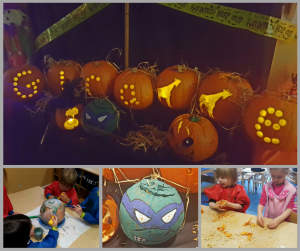
Rathfarnham
Here are some of the amazing pumpkin designs from other centres. Thank you to everyone who voted for our creative designs!
- Griffeen
- Leopardstown
- Lucan
- Harcourt Rd.
- Clonsilla
- Central Park
- Stepaside
- Park West
- Milltown
- Northern Cross
- Navan
- NCI
Time to wean?
When your child is ready to wean from milk to more solid foods, there’s no denying that food may end up in the strangest of places! The weaning process will take a lot of patience and perseverance, but it will be a rewarding experience for you and your baby.
Timing is important
Find a quiet time of day, maybe between meals when your child is not too hungry. Teaching a child a new life skill is going to be hard if they are tired, cross or – ironically in this case – hungry! In this way they won’t be frustrated by the fact that their hand to mouth co-ordination needs a little work and more food is spilling out than actually going in. Gently encourage them, with plenty of eye contact and smiles.
Relax – Food is fun!
Meal times are a wonderful social time for children to interact with an adult, and learn through observation. Your baby naturally will be interested in the foods you eat yourself, so you may like to involve them with a taste of plain mashed potatoes or pureed carrots. Just remember that too much added salt or flavourings are not recommended for young children so keep the soft foods you are preparing for your child as plain as possible. This way they can learn to appreciate the taste of all the news foods they are trying!
Weaning is an exciting time for both parent and child but sometimes your baby simply doesn’t want to know. Children will usually give you a good indication of when they’ve had enough or they lack interest on that particular day. If this is the case, don’t worry, simply try again in a few days. Sit with your child at mealtimes, bringing their chair to the table so they can see how you and your family enjoy eating different foods. Watch for the cues: If you are spoon feeding your child, take regular pauses to allow them the time to think and feel if they are full. You may see your child show you they are full with these cues: Keeping their mouth shut, pushing the spoon away, turning their head away from the food, sometimes spitting food out or holding food in their mouth longer than usual.
- Jenny @ Rathfarnham made wonderful platters of food for the Preschool Graduation.
Read Chef Natalia’s delicious dinner recipe!
Variety is key
In the early stages, it is important to introduce new foods one at a time, so as not to overwhelm your baby or risk digestive issues (or allergies). Once weaning is more established, make sure to offer your baby different tastes on a regular basis. You wouldn’t choose to eat carrots at every meal, so realistically why should your baby, regardless of whether they’re pureed, lightly mashed or teamed with baby rice? On the subject of texture, once your baby has mastered the basics and a few teeth are present, leave in some lumps, bumps and crunchy stuff for your child to enjoy and explore. Offer some water to your baby with their meal to ease digestion and keep them well hydrated.
If you plan to be out for the day with your child, prepare a weaning meal ahead of time and have plenty of finger foods available to encourage your child to keep weaning. When your child is in crèche or being minded by someone else, ask whoever is looking after them to continue to offer the weaning foods as well.
Prepare for a mess
Not only is weaning an important bonding process between you and your child, it also means a lot of cleaning! Babies naturally want to feel the texture of the food in their hands but will also grab tables, chairs and you when they are finished eating! Be prepared with a few wipes close by and cloth to wipe down any eating surfaces. A waterproof, full body washable bib is a good investment and can save at least one change of your baby’s clothes. Most of all, allow your child to explore their food, taste it and enjoy, the mess is easily cleaned!
Take a look at some of our menus
Summer Menu Autumn Menu Spring Menu Winter Menu
Tips for Toilet Training
Planning for the potty is all about timing… it’s when your child is ready! You will know when the time is right when your child has developed enough physical skills to be able to walk and climb the stairs, to wash their own hands, and are showing an interest in what is happening in the toilet. They also need to be ready to communicate and to take instructions from you, and be familiar with such words as ‘wee’ and ‘poo’ when they are doing them.
Some parents like to wait for a holiday to start the training but anytime is the right time if you feel your child is ready, it can even be tackled as a crash course over the weekend.
The first stage is to have the potty ready in the bathroom or toilet, with loo paper and wipes easily to hand, and a small step for your child to reach the sink to wash their hands. Talk to your child about how it’s going to work and maybe even have a trial run with a favourite teddy. Let them practice sitting on the potty as this is a skill in itself. If they refuse to sit on it, don’t force them. It’s probably not the right time to start. Always try to change your child’s nappy in that bathroom or toilet so that they associate the location with routine. When you are both ready, you can make a fuss of buying some special ‘grown-up’ pants with your child, and away you go!
Take your child to sit on the potty just before and about twenty minutes after meals and snacks. Stay with them and help if required. Be enthusiastic about any successes and keep to the routine of hand-washing afterwards. You may want to read or tell a short story as you wait for your child to go, or sing a song together.
Most children are interested in looking at their poo and there is no harm in that before you flush it away. Make sure you are not negative about the smell if your child proudly shows you what they have done! Use incentives to encourage your child, cuddles and a cheer can work wonders for your child’s learning process, and a sticker chart for successes can be fun.
Take your child to the potty before you go outside and when you come in, and you can use these opportunities for discussions with your child. When you first go out, keep trips quite short, and take a spare potty in a bag with a spare change of clothes for accidents.
Of course accidents will happen, but this is the way your child will learn to react to what is happening, so don’t punish them. Be very matter of fact about the accident and give it very little attention. Make sure you teach your child how to clean up after themselves. It will be a stressful time but if you do get angry or frustrated, don’t let your child see it. Always carry spare clothes, tissues, wipes and plastic bags ready for a change when required. If your child is in crèche, talk to your child’s key worker and share that you are starting to potty train so that you work together to support your child with the process.
If you find your child is not having any success, maybe they weren’t quite ready to start, talk to your child and tell him that it’s ok and try again at a later stage. Don’t give up as some children may take up to six months to finally master the process, just keep positive and keep praising the successes. Your responses to your child’s behaviour when learning to use the potty will have a great effect on how successfully they learn!
Let them Play!
Giraffe Training Academy – Wobbler Staff Workshop
Giraffe Childcare’s Training Academy hosted a training day for 75 practitioners on Saturday with Lillian and Carol from Early Childhood Ireland, delivering a session on Facilitating Play Based Learning. There were also a range of skills demonstrations modules delivered by some of Giraffe’s senior crèche managers to promote best practice in care for the Wobbler age group (typically 15-24 months).
Let them play…
Children learn about the world around them through natural exploration of their environment and free play where their imagination runs freely. Children play their way to learning! Children play everywhere – in their homes, in their local parks and schools and love to play. We all know it and the research supports it – children are happiest and at their most vital and energetic when they play.
For the afternoon session, some of our Giraffe centre managers delivered some skills demonstrations in small focus groups. The workshops covered topics like Children’s Health (presented by Jurgita & Liene), managing Transitions (presented by Gillian and Leona) , Communication/Key Carer Groups (presented by Karina & Caroline) as well as Garden Activity Ideas (presented by Sarah & Roisin). The sessions were both interactive and interesting and the team all had an opportunity to be hands on!
Team effort!
It was great day and we all enjoyed refreshing and developing our skills. We have had some wonderful feedback from our practitioners and Giraffe Training Academy will host further workshops for all of our care groups.
A big thank you to our Centre managers, the central support team and all the practitioners who made the day such a success!
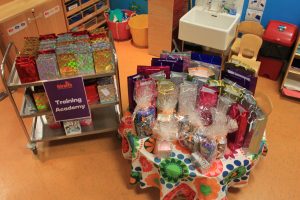
In recognition of their dedication, all of our staff went home with a small token of our appreciation and a treat to say thank you!
Click here to read more about Giraffe Training Academy
Affordable Childcare Schemes
Budget 2017 introduced a number of measures to assist parents with their childcare costs.
‘Universal’ Subsidy towards childcare costs
With effect from September 2017, all parents with a child attending a Tusla registered childcare service will receive a subsidy of up to €87 per month (€1040 per annum) towards their childcare costs. The subsidy will be allocated pro-rata depending on the number of hours per week a child attends their childcare service. The maximum rate of €87 per month is based on 40 hours childcare per week. The subsidy will be available to all children between the ages of 6 months and 3 years and will be paid directly to the childcare provider. The childcare provider will deduct the subsidy from the parents’ childcare fees. When the child reaches three years of age he or she will avail of the ECCE Preschool scheme until they start primary school.
Affordable Childcare Scheme
The Affordable Childcare Scheme is a targeted subsidy to assist with childcare costs, for children from 6 months old up to 15 years of age. The level of subsidy will depend on :
- The family’s net after tax income
- The number of children in a family
- The ages of the children.
The Affordable Childcare Scheme is currently available for ‘FIS’, Medical Card holders and One-Parent families. It is also available to Adult Learners enrolled in VTOS or ETB courses.
The maximum Affordable Childcare subsidy amounts to €8,000 per annum, or €667 per month towards childcare costs, and will be available to families with a net (after tax) income of €22,700 or less. The level of subsidy tapers downwards as a family’s net income rises, with no Affordable Childcare Subsidy available when net family income, with one child, reaches €47,500 or more. If a family has two children the maximum net income threshold increases to €51,300. The subsidy is payable to the childcare provider and is deducted from the net fee payable by the parent. It is intended that the Affordable Childcare Scheme will also be available to children in addition to the ECCE preschool scheme, where a family requires additional hours of childcare during the day.
For further information please call us on (01) 245 0935 or email us at info@giraffe.ie.
Staff Appreciation Month – Thanks a thousand!
“It takes a big heart to help shape growing minds”. (Anon)
Every morning, the pitter-patter of tiny feet and the sound of joyful little voices resonate around the rooms at Giraffe Childcare. Every morning, the carers, chefs and staff teams welcome the children and families at their centre with energy and enthusiasm for the upcoming day’s events.
Throughout the month of May, our staff appreciation month, we have been inundated with beautiful message saying “Thanks a Thousand” to Giraffe team members, for the wonderful work they do every day. We understand that as parents, it can be difficult to leave your child with someone else, so it’s reassuring to hear from other parents about the great experience that their children enjoy in Giraffe every day.
What started as a few messages quickly became an enormous collection of Thank You’s and wonderful appreciative messages.
Here are a few of the kind words from children and parents that were shared with Giraffe team members over the past few weeks:
- Thank yous @ NCI
- Thank yous @ NCI
- Thank yous @ NCI
“(My son) has received excellent care and developmental nurturing from everyone at crèche. Thank you all!” Nessa, Mum (Harcourt)
“I know you all work really hard every day ensuring Oscar and Sam are not only safe and healthy but happy, simulated and loved. It means so much to me to see Oscar run in to his room and hug his carer.” Orla, Mum (Rathborne)
“(Thank you ) to all the girls that mind me. xxx John” (Adamstown)
“I want to thank all the staff in Cherrywood you have helped Aaron on the way to becoming a confident little boy” – Fiona, Mum (Cherrywood)
“Thank you Lana – for the way my son talks about her everyday, in such a caring way, we are truly grateful.” Parent (Harcourt)
Because there have been so many notes and messages of appreciation, many Giraffe centres have made appreciation displays in their hallways. Please take a moment to stop and read about the incredible staff in your centre!
- IFSC
- Park West
- Leopardstown
- Adamstown
- NCI
- Cherrywood
- Liffey Valley
- Central Park
This month, we recognize those staff who have earned the Employee of the Quarter award, as well as some special Team member’s anniversaries!
- Justyna @ NCI
- Zoe @ Griffeen
- Jennifer @ Blanchardstown
- Lianne @ Rathfarnham
- Natalia from Northern Cross celebrates 10 years with Giraffe!
- Congrats Sandra in Cherrywood on 10 years with Giraffe!
- Happy Birthday April @ IFSC!
- Kerya Lin in Harcourt Road, who is celebrating 10 years with Giraffe!!
- Congratulations to Aoife, our staff member of the quarter at IFSC!
- Well done to Emma, Sadaka, Catarina & Alanna from Giraffe Rathbourne who completed a Paediatric First Aid course.
A big THANK YOU to all our centre chefs who prepare deliciously nutritious meals and snacks for the children everyday, spending a lot of time and dedication making their sauces all from scratch!
- Congratulations chef Touria in Closilla, who recently passed her catering exams!
- Jenny @ Rathfarnham made wonderful platters of food for the Preschool Graduation.
- An amazing edible creation by Chef Jill in Elm Park.
Congratulations to all the Mums-to-be and Parents currently on parental leave with their babies.
- Baby shower in Cherrywood for our three Mums to be – Lisa, Ciara and Sandra!
- Ciara & Oscar @ Central Park
A very special mention to Samantha in Celbridge, who helped raise money for the Irish Cancer Society and took part in this year’s Shave or Dye campaign!!
- Before…
- …During…
- …After!
Here are just a few snapshots of what the Giraffe team members get up to during their busy days!
- Suzi & Esther @ NCI
- Tara @ Lucan
- Centre Manager Carol @ Elm Park
- Shannan,Rachel & Marta @ Parkwest
- Marathon Team @ Lucan
- Jackie @ Northern Cross
- Paula & Karina @ Celbridge
- Niamh @ Adamstown
- National Workplace Wellness Day @ Griffeen
- Saberin, Yaiza, Amy @ Milltown
- Fitness Day @IFSC
We believe that through a commitment to our role as carers and educators, we make a positive difference to the lives of families, a children, our community and each other. Our carers share a passion and depth of knowledge and wealth of experience in childcare. After receiving so many wonderful Thank You messages, we are so grateful for the continued support from every parent and child.
National Workplace Wellbeing Day
Supporting Wellbeing in the Workplace!
April 8th was Ireland’s second National Workplace Wellbeing Day. Giraffe Childcare were proud to participate in this initiative to help improve employee health through promoting better nutrition and physical activity. Our teams came up with creative fitness activities and focused on wellbeing throughout the day.
Healthy Eating Initiatives
On Friday morning, all of our Giraffe centres received fresh fruit baskets for the staff to enjoy on their breaks. Here are some of our centre staff enjoying their healthy morning snacks!
- NCI
- Harcourt
- Blanchardstown
Many of our centres organised Fitness activities for the children to enjoy, both indoors and outside. Some of the planned activities included Early morning stretching, Yoga, jogging, team sports and obstacle courses. They look like they all really enjoyed doing these fun and energetic exercises.
- Central Park
- Central Park
- IFSC
- Lucan
- Adamstown
- Adamstown
- Blanchardstown
- Griffeen
- Parkwest
- Parkwest
- NCI
- Clonsilla
- Griffeen
- Fitness Day @IFSC
The Lunchtime Mile
As part of the many planned activities to support National workplace Wellbeing Day, some Giraffe centres took part in the Lunchtime Mile. This was an initiative to encourage everyone to get out on their Lunch break and walk, jog, run, cycle or swim up to a mile!
- Harcourt Walkers on their Lunchtime Mile.
- IFSC Fitness team struting their stuff
- These walkers at Rathfarnham are all smiles
Cycle To Work Scheme
At Giraffe we are proud to support the “Cycle to Work Scheme” and encourage our team members to sign up to this great incentive. Here are some enthusiastic cyclists who peddle to work everyday!
- Well done to Veronica & Silvija from Clonsilla.
- Cristina from Harcourt shows off her wheels.
Well done to all Giraffe team members who took park in National Workplace Wellbeing Day. Keep up the healthy habits!
